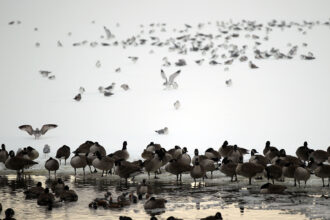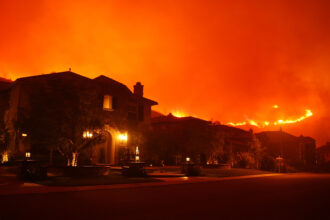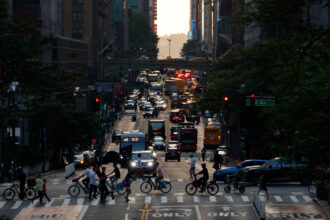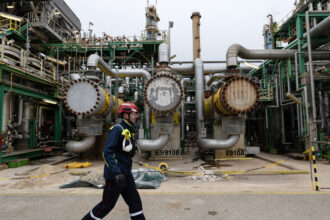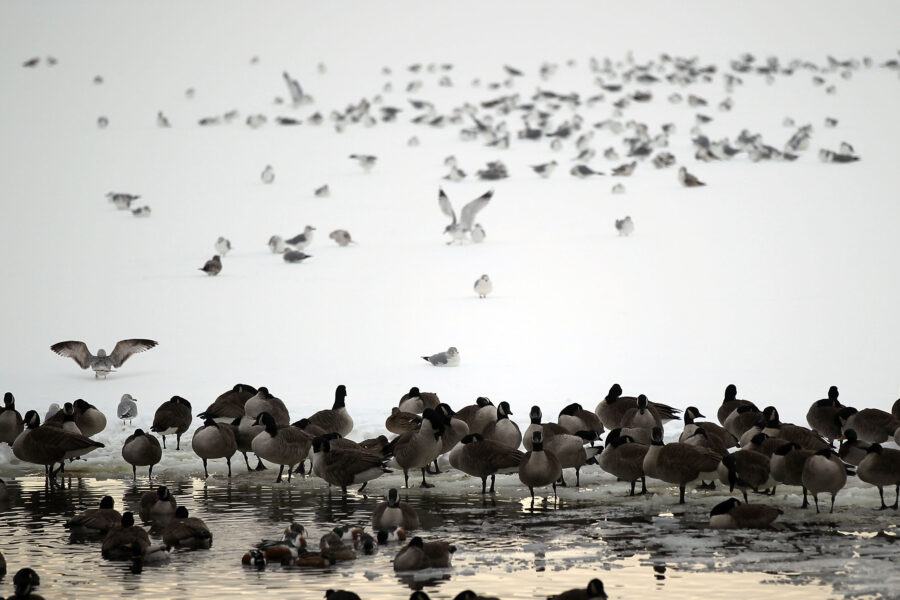As Ukrainians awoke to the sounds of explosions and reports of a Russian invasion last week, a delegation of Ukraine’s top climate experts had a difficult decision to make: wrap up their work on the major climate report set to be released in a matter of days or pull out of the process and seek refuge.
“I just realized that it’s not possible because there’s real danger for me and my family, and all our delegates,” Svitlana Krakovska, a climate scientist who led Ukraine’s contributions to the Intergovernmental Panel on Climate Change’s Sixth Assessment Report on global warming, told POLITICO last week. “It’s very difficult to think about climate change impacts when you have impacts of Russian missiles in our Kyiv, and tanks everywhere.”
The 3,675-page IPCC report, published Monday by hundreds of experts living in almost every country, detailed in stark terms how the deadly and destructive consequences of the climate crisis were already happening, and warned that humanity was not adapting nearly fast enough to the world’s new realities.
But as Russian aggression reached the outskirts of the Ukrainian capital on Friday, the country’s climate scientists were forced to retreat from their work amid intermittent shelling and a lack of internet. Ukraine’s sole author to the IPCC assessment—a botanist at the National Academy of Sciences of Ukraine named Yakiv Didukh—performed the final line-checks for his section of the report from a bomb shelter in Kyiv.
“I can hear explosions from my house,” Didukh told Reuters. “It is difficult for me now to think and talk about the climate, because the psychological situation is very tense. I am waiting and hoping that this will end and I will be able to do science.”
But experts have said considering the Russia-Ukraine conflict in terms of climate change is paramount. And some scientists worried that the war might draw attention away from the gravity of Monday’s report, including that any further delay in transitioning the global economy to carbon-free energy would be an existential threat to humankind and many of the world’s ecosystems.
It might be hard to concentrate on the new science assessment as a war erupts in Europe, but it’s important to focus on both subjects at the same time because they are deeply related, Rod Schoonover, a climate security expert with the Council on Strategic Risks’ Center for Climate and Security, and a former United States intelligence officer, told ICN’s Bob Berwyn.
“You shouldn’t shut one or the other off. Humanity’s relationship to fossil fuel is underwriting this invasion,” he said. “Putin thought he could get away with it because of Europe’s dependence on Russian gas.”
Others online made similar connections, with Twitter users on Monday comparing Russia’s invasion of Ukraine to the United States’ invasion of Iraq in 2003. For years, energy experts have said that the U.S. takeover of Iraq was more about securing strategic oil reserves than it was about reports of the country having weapons of mass destruction—reports that were later found to be untrue.
In fact, the Russian invasion has spurred scientists, energy analysts and climate activists to call for a quicker transition to renewable energy, which they say would supply countries with cheap electricity and help diffuse international tensions exacerbated by energy insecurity.
Several studies have warned that as the climate crisis worsens, armed conflicts will increase, as nations fight over dwindling resources, including access to clean water, and as refugees flee from social unrest and worsening storms, heatwaves and droughts.
That idea, that climate change is a “threat multiplier,” is one reason why the U.S. Army released its first climate strategy this month in an effort to better prepare for more conflicts driven by global warming.
There’s “an increased risk of armed conflict in places where established social orders and populations are disrupted,” the army strategy said. “The risk will rise even more where climate effects compound social instability, reduce access to basic necessities, undermine fragile governments and economies, damage vital infrastructure, and lower agricultural production.”
Thanks for reading Today’s Climate, and I’ll be back in your inbox Friday.
Today’s Indicator
2035
That’s the year Germany is considering requiring its energy sector to become fully powered by renewable sources, potentially one of the most ambitious climate targets in the world, u003ca href=u0022https://www.reuters.com/business/sustainable-business/germany-aims-get-100-energy-renewable-sources-by-2035-2022-02-28/u0022u003eaccording to Reutersu003c/au003e.
Top News from Our Warming World
U.S. Oil Industry Uses Ukraine Invasion to Push for More Drilling at Home – The New York Times
Biden Nominated Ketanji Brown Jackson to the Supreme Court. What Are Her Climate Views? – E&E News
These Climate Scientists Are Fed Up and Ready to Go on Strike – The New York Times
About This Story
Perhaps you noticed: This story, like all the news we publish, is free to read. That’s because Inside Climate News is a 501c3 nonprofit organization. We do not charge a subscription fee, lock our news behind a paywall, or clutter our website with ads. We make our news on climate and the environment freely available to you and anyone who wants it.
That’s not all. We also share our news for free with scores of other media organizations around the country. Many of them can’t afford to do environmental journalism of their own. We’ve built bureaus from coast to coast to report local stories, collaborate with local newsrooms and co-publish articles so that this vital work is shared as widely as possible.
Two of us launched ICN in 2007. Six years later we earned a Pulitzer Prize for National Reporting, and now we run the oldest and largest dedicated climate newsroom in the nation. We tell the story in all its complexity. We hold polluters accountable. We expose environmental injustice. We debunk misinformation. We scrutinize solutions and inspire action.
Donations from readers like you fund every aspect of what we do. If you don’t already, will you support our ongoing work, our reporting on the biggest crisis facing our planet, and help us reach even more readers in more places?
Please take a moment to make a tax-deductible donation. Every one of them makes a difference.
Thank you,







